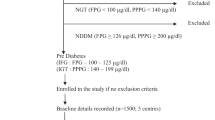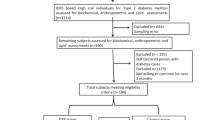Abstract
Purpose
Prior systematic reviews on yoga and diabetes have given conflicting results. They have been limited by inclusion of uncontrolled unblinded single group observational studies. No reviews are available which have used the Cochrane methodology and GRADE (Grades of Recommendation, Assessment, Development and Evaluation) approach. This meta-analysis evaluated the efficacy of yoga on glycaemia and lipids in T2DM using the Cochrane methodology and GRADE approach.
Methods
Major repositories were searched to pick randomized controlled trials involving T2DM patients receiving yoga. Primary outcome was to evaluate changes in fasting plasma glucose (FPG) and glycated haemoglobin (HbA1c). Secondary outcomes were to evaluate changes in post-prandial plasma glucose (PPG), total cholesterol (TC), triglycerides, low-density lipoprotein cholesterol (LDL-C) and high-density lipoprotein cholesterol (HDL-C). Sub-group analysis involving people undergoing structured exercise regimen (SER) versus those undergoing standard diabetes care in controls was done.
Results
Data from 13 studies involving 1440 patients were analysed. Compared to controls, individuals doing yoga had significantly lower FPG [mean difference (MD) -17.22 mg/dl (95% CI: −26.19 – −8.26 mg/dl); p < 0.01; considerable heterogeneity (CH); low certainty of evidence (LCE)], PPG [MD -27.77 mg/dl (95% CI: −35.73 – −19.81 mg/dl); p < 0.01; low heterogeneity; moderate certainty of evidence (MCE)], TC [MD -19.48 mg/dl (95% CI: −31.97 – −6.99 mg/dl); p < 0.01; CH; LCE], triglycerides [MD -12.99 mg/dl (95% CI: −23.74 – −2.25 mg/dl); p < 0.01; CH; LCE], LDL-C [MD -11.71 mg/dl (95% CI: −17.49 – −5.93 mg/dl); p < 0.01; I2 = 69% CH; LCE] and significantly higher HDL-C [MD 4.58 mg/dl (95% CI: 3.98–5.18 mg/dl); p < 0.01; low heterogeneity; MCE]. On sub-group analysis, where yoga was compared to SER, FPG was significantly lower in yoga group.
Conclusion
Yoga improves glycaemia and lipid parameters in T2DM with additional benefits seen both in people doing/not doing structured exercise.




Similar content being viewed by others
References
Dutta D, Ghosh S. Young-onset diabetes: an Indian perspective. Indian J Med Res. 2019;149:441–2.
Dutta D, Mukhopadhyay S. Intervening at prediabetes stage is critical to controlling the diabetes epidemic among Asian Indians. Indian J Med Res. 2016;143:401–4.
Gupta L, Khandelwal D, Lal PR, Gupta Y, Kalra S, Dutta D. Factors determining the success of therapeutic lifestyle interventions in diabetes - role of partner and family support. Eur Endocrinol. 2019;15:18–24.
Raveendran AV, Deshpandae A, Joshi SR. Therapeutic role of yoga in type 2 diabetes. Endocrinol Metab (Seoul). 2018;33:307–17.
Kiecolt-Glaser JK, Christian LM, Andridge R, Hwang BS, Malarkey WB, Belury MA, et al. Adiponectin, leptin, and yoga practice. Physiol Behav. 2012;107:809–13.
Hagins M, States R, Selfe T, Innes K. Effectiveness of yoga for hypertension: systematic review and meta-analysis. Evid Based Complement Alternat Med. 2013;2013:1–13.7.
Raub JA. Psychophysiologic effects of hatha yoga on musculoskeletal andcardiopulmonary function: a literature review. J Alternat Complement Med. 2002;8:797–812.8.
Campbell DE, Moore KA. Yoga as a preventative and treatment for depression,anxiety, and stress. Int J Yoga Ther. 2004;14:53–58.12 Yoga as a Preventative and Treatment for Depression, Anxiety, and Stress.
Sharma M. Yoga as an alternative and complementary approach for stressmanagement: a systematic review. J Evid Based Complement Alternat Med. 2014;19:59–67.14.
Higgins JP, Altman DG, Gotzsche PC, et al. Cochrane Collaboration’s tool for assessing risk of bias in randomised trials. BMJ. 2011;343:d5928.
Liberati A, Altman DG, Tetzlaff J, et al. The PRISMA statement for reporting systematic reviews and metaanalyses of studies that evaluate healthcare interventions: explanation and elaboration. BMJ. 2009;339:b2700.
Popli U, Subbe CP, Sunil K. Research letter-the role of yoga as a lifestyle modification in treatment of diabetes mellitus: results of a pilot study. Altern Ther Health Med. 2014;20:24–6.
Hegde SV, Adhikari P, Kotian SM, Shastry R. Effects of Yoga Versus Sham Yoga on Oxidative Stress, Glycemic Status, and Anthropometry in Type 2 Diabetes Mellitus: A Single-Blinded Randomized Pilot Study. Int J Yoga Therap. 2019. https://doi.org/10.17761/D-18-2020-00018.
Skoro-Kondza L, Tai SS, Gadelrab R, Drincevic D, Greenhalgh T. Community based yoga classes for type 2 diabetes: an exploratory randomised controlled trial. BMC Health Serv Res. 2009;9:33. https://doi.org/10.1186/1472-6963-9-33.
Jyotsna VP, Dhawan A, Sreenivas V, Deepak KK, Singla R. Completion report: effect of comprehensive yogic breathing program on type 2 diabetes: a randomized control trial. Indian J Endocr Metab. 2014;18:582–4.
Jyotsna VP, Ambekar S, Singla R, Joshi A, Dhawan A, Kumar N, et al. Cardiac autonomic function in patients with diabetes improves with practice of comprehensive yogic breathing program. Indian J Endocr Metab. 2013;17:480–5.
Jyotsna VP, Joshi A, Ambekar S, Kumar N, Dhawan A, Sreenivas V. Comprehensive yogic breathing program improves quality of life in patients with diabetes. Indian J Endocr Metab. 2012;16:423–8.
Gordon LA, Morrison EY, McGrowder DA, Young R, Fraser YT, Zamora EM, et al. Effect of exercise therapy on lipid profile and oxidative stress indicators in patients with type 2 diabetes. BMC Complement Altern Med. 2008;8:21.
Datey P, Hankey A, Nagendra HR. Combined Ayurveda and yoga practices for newly diagnosed type 2 diabetes mellitus: a controlled trial. Complement Med Res. 2018;25:16–23.
Bock BC, Thind H, Fava JL, Dunsiger S, Guthrie KM, Stroud L, et al. Feasibility of yoga as a complementary therapy for patients with type 2 diabetes: The Healthy Active and in Control (HA1C) study. Complement Ther Med. 2019;42:125–31.
Sreedevi A, Gopalakrishnan UA, Karimassery Ramaiyer S, Kamalamma L. A randomized controlled trial of the effect of yoga and peer support on glycaemic outcomes in women with type 2 diabetes mellitus: a feasibility study. BMC Complement Altern Med. 2017;17:100.
Bairy S, Rao MR, Edla SR, Manthena SR, Tatavarti NVGD. Effect of an integrated naturopathy and yoga program on long-term glycemic control in type 2 diabetes mellitus patients: a prospective cohort study. Int J Yoga. 2020;13:42–9.
Vaishali K, Vijaya Kumar K, Adhikari P, UnniKrishnan B. Effects of yoga-based program on glycosylated hemoglobin level serum lipid profile in community dwelling elderly subjects with chronic type 2 diabetes mellitus–a randomized controlled trial. Phys Occup Ther Geriatrics. 2012;30:22–30.
McDermott KA, Rao MR, Nagarathna R, Murphy EJ, Burke A, Nagendra RH, et al. A yoga intervention for type 2 diabetes risk reduction: a pilot randomized controlled trial. BMC Complement Altern Med. 2014;14:212.
Shantakumari N, Sequeira S. El deeb R. Effects of a yoga intervention on lipid profiles of diabetes patients with dyslipidemia. Indian Heart J. 2013;65:127–31.
Ebrahimi M, Guilan-Nejad TN, Pordanjani AF. Effect of yoga and aerobics exercise on sleep quality in women with type 2 diabetes: a randomized controlled trial. Sleep Sci. 2017;10:68–72.
Sharma R, Shahi VK, Khanduri S, Goyal A, Chaudhary S, Rana RK, et al. Effect of Ayurveda intervention, lifestyle modification and Yoga in prediabetic and type 2 diabetes under the National Programme for Prevention and Control of Cancer, Diabetes, Cardiovascular Diseases and Stroke (NPCDCS)–AYUSH integration project. AYU. 2019;40:8–15.
Sreedevi A, Unnikrishnan AG, Karimassery SR, Deepak KS. The effect of yoga and peer support interventions on the quality of life of women with diabetes: results of a randomized controlled trial. Indian J Endocr Metab. 2017;21:524–30.
Nagarathna R, Tyagi R, Kaur G, Vendan V, Acharya IN, Anand A, Singh A, Nagendra HR. Efficacy of a Validated Yoga Protocol on Dyslipidemia in Diabetes Patients: NMB-2017 India Trial. Medicines (Basel). 2019 6(4). E100. doi: https://doi.org/10.3390/medicines6040100.
Guyatt GH, Oxman AD, Vist GE, Kunz R, Falck-Ytter Y, Alonso-Coello P, et al. GRADE: an emerging consensus on rating quality of evidence and strength of recommendations. BMJ. 2008;336:924–6.
Keerthi GS, Pal P, Pal GK, Sahoo JP, Sridhar MG, Balachander J. Effect of 12 weeks of yoga therapy on quality of life and Indian diabetes risk score in normotensive Indian Young adult Prediabetics and diabetics: randomized control trial. J Clin Diagn Res. 2017;11:CC10–4.
Ramamoorthi R, Gahreman D, Skinner T, Moss S. The effect of yoga practice on glycemic control and other health parameters in the prediabetic state: a systematic review and meta-analysis. PLoS One. 2019;14(10):e0221067.
Innes KE, Vincent HK. The influence of yoga-based programs on risk profiles in adults with type 2 diabetes mellitus: a systematic review. Evid Based Complement Alternat Med. 2007;4:469–86. https://doi.org/10.1093/ecam/nel103.
Aljasir B, Bryson M, Al-Shehri B. Yoga practice for the Management of Type II diabetes mellitus in adults: a systematic review. Evid Based Complement Alternat Med. 2010;7(4):399–408.
Cui J, Yan JH, Yan LM, Pan L, Le JJ, Guo YZ. Effects of yoga in adults with type 2 diabetes mellitus: a meta-analysis. J Diabetes Investig. 2017;8:201–9.
Innes KE, Selfe TK. Yoga for adults with type 2 diabetes: a systematic review of controlled trials. J Diabetes Res. 2016;2016:6979370.
Kumar V, Jagannathan A, Philip M, Thulasi A, Angadi P, Raghuram N. Role of yoga for patients with type II diabetes mellitus: a systematic review and meta-analysis. Complement Ther Med. 2016;25:104–12.
Vizcaino M, Stover E. The effect of yoga practice on glycemic control and other health parameters in type 2 diabetes mellitus patients: a systematic review and meta-analysis. Complement Ther Med. 2016;28:57–66.
Thind H, Lantini R, Balletto BL, Donahue ML, Salmoirago-Blotcher E, Bock BC, et al. The effects of yoga among adults with type 2 diabetes: A systematic review and meta-analysis. Prev Med. 2017;105:116–26.
Jayawardena R, Ranasinghe P, Chathuranga T, Atapattu PM, Misra A. The benefits of yoga practice compared to physical exercise in the management of type 2 diabetes mellitus: a systematic review and meta-analysis. Diabetes Metab Syndr. 2018;12(5):795–805.
Author information
Authors and Affiliations
Corresponding author
Ethics declarations
Conflict of interests
DD, SB, MS, DK, VS and SK have no conflict of interests with regard to this research work and have nothing to declare.
Additional information
Publisher’s note
Springer Nature remains neutral with regard to jurisdictional claims in published maps and institutional affiliations.
Supplementary Information
ESM 1
(DOC 64 kb)
Supplementary Figure-1: Forest plot evaluating the impact of yoga on (a): fasting blood glucose with subgroup analysis; (b): glycated haemoglobin (Hba1c) with subgroup analysis; (c): post-prandial blood glucose with subgroup analysis; (d): total cholesterol with subgroup analysis
The sizes of the boxes are proportional to the weight of each individual study in the analyses. The summary effect size is represented by a diamond; Active exercise regimen controls represent the structured exercise regimen (SER) sub-group; Passive control group represent the standard diabetes care (SDC) sub-group (JPG 743 kb)
Supplementary Figure-2: Forest plot evaluating the impact of yoga on (a): triglycerides with subgroup analysis; (b): LDL-cholesterol with subgroup analysis; (c): HDL-cholesterol with subgroup analysis.
The sizes of the boxes are proportional to the weight of each individual study in the analyses. The summary effect size is represented by a diamond; Active exercise regimen controls represent the structured exercise regimen (SER) sub-group; Passive control group represent the standard diabetes care (SDC) sub-group (JPG 380 kb)
Rights and permissions
About this article
Cite this article
Dutta, D., Bhattacharya, S., Sharma, M. et al. Effect of yoga on glycemia and lipid parameters in type-2 diabetes: a meta-analysis. J Diabetes Metab Disord 20, 349–367 (2021). https://doi.org/10.1007/s40200-021-00751-0
Received:
Accepted:
Published:
Issue Date:
DOI: https://doi.org/10.1007/s40200-021-00751-0




